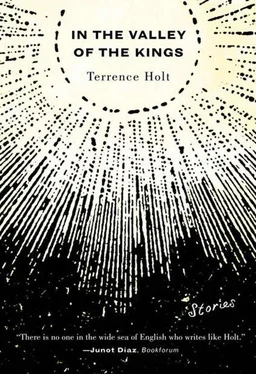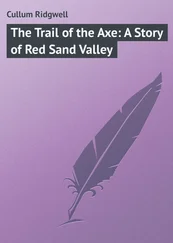The answers took their time in coming. For months I lived, and worked, met my classes, and among the stacks of the library heard my own footsteps click hollowly, echoes in a world grown mute and vague. The obscuration at the center of my vision was only occasionally troublesome. I soon learned to look sidelong at what I wished to see clearly.
The whispers grow louder: often of late I have caught myself looking up to see who is calling. I look up, and almost speak, before I see I am alone.

company of gods said, “What hath happened?” and his gods exclaimed “What is it?” But Ra could not answer, for his jaws trembled; the poison spread swiftly through his flesh. When the great god had found his heart, he cried unto those who were in his train, saying “A calamity hath fallen upon me. My heart perceiveth it, but my eyes see it not; my hand hath not caused it, nor do I know who hath done this unto me. Never have I felt such pain, neither can sickness cause more woe than this.”
Then Isis came unto him, her mouth full of the breath of life, saying, “What hath come to pass, O holy father?”
“That which I saw not. Is it fire? Is it water? I cannot see the sky.”
“O tell me thy name, holy father, and I will cure thee.”
“I have multitudes of names and multitudes of forms, but my true name my father uttered. It hath been hidden within me before he begat me, who would not that the words of power of another should have dominion over me. I am Khepera in the morning, I am Ra at noon, and I am Tmu at eventide. Let those call the poison from me.”
The poison pierced deeper, and the great god could no longer walk.
“What thou hast said is not thy holy name. O tell it unto me, and the poison shall depart.”
Now the poison burned like fire, and it was fiercer than the flame and the furnace, and the majesty of the god said, “I consent that Isis shall search me, even unto my navel, and that my name shall pass from me into her.”
Thus was the name of the great god taken from him, and Isis said, “Depart, poison. It is I who work, for it was I who made to fall down the poison. And what I made I claim.”
Then the god hid himself from the gods, and his place in the boat of millions of years was empty.
These are the words of her whose own name we know not, who knew Ra by his holy name. In later days her son took the name, and the two eyes of the holy god, and the name of the queen his mother, but the story of this is not told.

The story cannot be told. I cannot imagine the story of the King. I know there was a King, and that he lived, day to day, under the same sun as I, on the same Earth as I, in a world not so different from the one I inhabit, among faces not so different from the faces I see, the voices I hear on any day, speaking a language not so strange that I, some forty-five centuries later, cannot form its syllables upon my tongue. He had a tongue like mine to speak, a hand like mine to scribe.
But I cannot imagine the story of the King.
There it is: I tell myself that human nature does not change, and this may be so. I tell myself that the world does not change, and this also may be so: the conditions of existence remain. But for all the comfort such endurance offers, when I face the gulf dividing us, the heart goes out of me. Before the appalling fact of those four millennia and more — one million five hundred and sixty-nine thousand five hundred and so many days from the moment he went into his tomb, so many countable minutes each following each in unbroken succession until the day I came squalling and slippery into life: words desert me.
I know now why they required spells to remember their names in the underworld, why they treasured up spells empowering them to speak. Already before the same void I find myself falling silent. The Summer is upon us; the halls are emptied of students, and the campus has gone lush and quiet. The echo of my footsteps flies down the hallway, fading, and I know that before the Fall term comes, I will follow them.

A word of power. The mind does not reel. A word, we know, has no power. So I once believed. But in a lifetime of research into Egypt, I have become skeptical — unsure of much we in our century take on faith.
I would adduce my reasons; I cannot. A word of power has nothing to do with reason.
Look around you: how much of the power that affects your life has to do with reason? A half-bright undergraduate can tell how long a pebble dropped will fall before it hits the bottom of a well. But not one of my colleagues on the faculty in physics can tell you why . Mass attracts mass, they say. Why? Because it does, they aver, uncomfortably echoing Aristotle. If pressed, they will confess it: We don’t know why .
And so it is, for every phenomenal and noumenal event you name. Trace the chimera Reason to its den, and the ground collapses at your feet. Certain things are. Then they are not. And if, at their beginning and their end, things challenge our sense of how events ought to proceed, the outrage committed against reason is the least of consequences that should concern us.
Evidence, then. On my side of the issue I can produce, as some have already observed, no evidence. I can only suggest, in words, that which I feel with a poignancy that makes all reason hollow, all evidence evanescence, all words the stuff of dream. What I feel, what I know, I cannot speak outright; only sidelong, only glancingly can I tell you what will never be the thing itself.
It has that to do with what you will never know, unless you have, as I, been present at the opening of an Egyptian tomb.

The door is sealed, plastered over from threshold to lintel with a fine, smooth grout, mud of the Nile, the stuff of Chaos itself. In it, one can see the impression of the trowel: here and there the thumbprints of the plasterers, the loops and whorls of their fingerprints intact — fingers that went in time into their own tombs, and moldered into dust — here, still, after five thousand years: you may place your own thumb there, into the lapse of fifty centuries, fit it into the empty socket, filling up the space that once was filled by fingers of a living hand.
Behind the plaster is stone. It comes down, course by uneven course, baulked by oak logs light as balsa now. A haze of dust rises, hovers around you in the stillness, until the moment when your chisel enters the emptiness beyond: a hot, dry air escapes. The tomb has let its final breath at last, as if the one immured within has only now, after long millennia of sleep, given up the ghost.
In a clean tomb, where no water has seeped, the air is adust, and the odor it carries seems to rise from the parching of your own nostrils. In the tombs where rot has entered, that most ravenous of tomb-robbers gusts great squalls of laughter, leaps eagerly to greet you, draw you in to share the sport of its long feast. So it was in Nur-Mar’s tomb: at the opening of the probe-hole, the candle we held into the escaping wind died, and the tunnel filled with a horrible presence — not decay, not a smell at all: the presence in the tunnel was sensible only in the hairs it stirred upon our necks.
The clearing of the door told why. Nur-Mar had been buried with an Answerer.
Читать дальше














